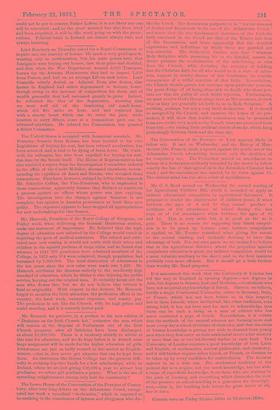The Lower House of the Convocation of the Province of
Canter- bury, after very long debate on the Athanasian Creed, excogi- tated last week a synodical " declaration," which is expected to be soothing to the consciences of laymen and clergymen who dis- like the Creed. The declaration purports to be "for the removal of doubts and disquietude in the use of the Athanasian Creed," and states that the two fundamental doctrines of the Catholic faith contained in the Creed are that of the Trinity and that of the Incarnation, and hints apparently that the detailed expressions and definitions by which these are guarded are non-essential. The declaration further says that " whereas Holy Scripture while promising life to the faithful, asserts in divers passages the condemnation of the unbelieving, so also does the Church, while declaring the necessity of holding fast the Christian faith for all who would be in a state of salva- tion, express in sundry clauses of this Confession the terrible consequence of a wilful rejection of that faith. Nevertheless, the Church therein passes not sentence upon particular persona, the great Judge of all being alone able to decide who those per- sons are that are guilty of such wilful rejection. Furthermore, we must receive God's threatenings even as His promises, in such wise as they are generally set forth to us in Holy Scripture." A soothing, perhaps, but not a very lucid declaration. if it should be accepted by the Church, and answers the hopes of its pro- moters, it will show that tender consciences can be protected from sun-stroke very much as the French vines are protected from frost-bite,—by raising little artificial clouds of smoke, which hang protectingly between them and the clear sky.


































 Previous page
Previous page